Within five years, Gwadar will become a regional logistics hub
Zhang Baozhong, Chairman of China Overseas Port Holding Company (COPHC), has stated that Gwadar, a key component of the China Pakistan Economic Corridor (CPEC), will become the region’s logistic hub within five years.
“According to our plans, Gwadar will become the region’s logistical center in five years!” While reviewing Gwadar’s 5-year voyage, Zhang Baozhong addressed China Economic Net (CEN).
The Free Zone will be fully developed according to its concept; free zone investors will directly employ more than 30,000 people, and at least $10 billion in GDP will be contributed to Pakistan’s economy.
The lives of local people will be drastically enhanced or modified as a result of this economic development; new schools, hotels, and medical facilities will be built; and water and power concerns will be resolved totally.
Zhang asked a variety of businesses to invest in Gwadar’s bright future. “Gwadar will become one of the world’s most lovely cities – a human dreamland!”
As Gwadar is the gateway to Middle Asian countries, he stated that logistics is one of the best companies in the city. The port, on the other hand, will not earn any revenue. To develop the port, a sufficient volume of commerce is required and a solid logistical system to handle the cargo. According to Zhang, the development of free zones and the development of ports are twin siblings.
Many plants rely on gas, LPG, or LNG. Thus an oil refinery is also welcomed. Gwadar is close to oil-rich countries such as Oman and Saudi Arabia. Therefore raw resources are easily accessible. This venture will benefit the port of Gwadar and Pakistan’s ability to maintain a steady supply of critical industrial supplies.
“Agriculture is the third,” Zhang explained. Pakistan’s land is rich and fertile, but it has been underutilized for far too long. “We hope that some investor would join the local community to properly develop the land and boost crop yield.”
Finally, food processing, particularly Halal food processing, is strongly suggested. “If we have food that meets international standards, our product will be able to compete on a global scale.”
“I believe that Gwadar will become the region’s new economic centre and that it will play a major role in the development of south Pakistan, Afghanistan, and even Middle Eastern countries,” Zhang said.
“I thought I was on Mars,” he reminisced as he stepped into Gwadar for the first time. In the dusty Gwadar of 2016, there were few activities, few people, and little transportation. The entire city lacked a conducive business environment.’
“I was under such duress that I thought [developing Gwadar] was a task unattainable,” Zhang remarked. There were no signals or internet at the time. He lost contact with his family and the corporate office for two weeks.
The endeavor, like life, was difficult. How was it possible to achieve the government’s goal? “I sent a lot of reports to the Chinese government, to my head office, and I talked to my Pakistani brethren on the ground.” And we were quite fortunate in that both governments aided us greatly.”
Read more with EL news : Putting the country’s future economic growth at risk
“Everyone in Pakistan, from the top down to the bottom up, has been really helpful and nice to us.” They are also willing to help us overcome whatever obstacles we may face. “We are grateful to the Pakistani government for providing us with 923 hectares (10 square kilometers) of land dedicated to the establishment of the Free Zone, as well as investor incentives,” he said.
To entice investors, the Pakistani government has introduced the Finance Bill 2020, which grants all investors a 23-year tax holiday. “There are numerous tasks to be completed.” Zhang proudly stated, “This building, this free zone, and this port are as good as any other ports, any other free zones in the globe.”
“We will construct Gwadar Port step by step, following this concept,” he added. People here are well aware of how far it has progressed. And we can predict what will happen based on the last five years’ development.”
Gwadar has come a long way since then. “A lot of new structures are being built; several lovely villas have been completed, and everyone is busy with their work,” Zhang Baozhong stated.
For the past ten years, no single commercial shipping line linking Gwadar port, and the port has had to rely on government-directed cargo and heavily subsidised road transport, according to Zhang.
However, since COPHC took over the port and renovated facilities, things have altered, particularly since Afghan transit cargo began processing through Gwadar port on January 14, 2020. Despite the pandemic on business development, the port has processed more than 100,000 metric tonnes of Afghan cargo. “LPG ships and bulk cargo ships are routinely spotted approaching,” Zhang told China Economic Net.
All of these actions not only created a slew of new business prospects for Pakistani stevedoring companies, transporters, customer clearance organisations, and a slew of other businesses, but they also helped stabilise supply to Afghanistan and other Central Asian landlocked countries.
Zhang Baozhong, speaking about the Gwadar Free Zone, Pakistan’s first modern industrial park, claimed that 46 businesses have registered for investment in the Free Zone so far, particularly in logistics, warehousing, Halal food processing, agriculture, textiles, and so on.
“A growing number of investors are expressing an interest in investing in this area,” he continued.
Also taken into account is social wellbeing. “We are doing everything we can to assist our local brothers and sisters,” Zhang said, noting that the China-Pakistan Gwadar Faqeer Primary School, which was donated by the China Foundation for Peace and Development (CFPD) and has been sponsored by COPHC for the past five years, has been in operation.
“Previously, there was no school in the Faqeer community.” Local children must walk for miles to get to school. As a result, we chose the poorest neighbourhood in which to build this school.” This school is now regarded as one of the best in Gwadar. More than 700 boys and girls are receiving an education at the institution.
The following step is to create local job possibilities. The majority of development duty, as Zhang put it, falls on the shoulders of the locals. Pakistanis make up more than 800 of the workers. Balochistan accounts for 85 percent of them.
“If you come to my office, you’ll hear Balochi, Urdu, and English being spoken by everyone.” The Pak-China Friendship Green Park, which provides additional greenery to Gwadar, also provides many jobs to locals. Moreover, during the COVID-19 pandemic, when fish could not be exported, a clothing factory offered local women job opportunities to help feed their families.
“I am pleased to report that our Gwadar brothers and sisters give the most time and effort to the development of the city. It is their motherland; it is their home, and they adore their motherland. They wish to build their motherland. They want their children and grandchildren to be able to enjoy modern life. “You can’t tell a good story without them,” Zhang remarked.
“We are experiencing a shortage of trained technicians and engineers,” he stated, referring to difficulties such as water, energy, education, medical care, and security for investors and operators. Local folks can be as good as any other technicians in Islamabad or Lahore if we offer them an opportunity to learn.”
On October 1, the China Aid Technical & Vocational Institute of the Gwadar Port Project was completed, marking a significant milestone. Zhang expects that by establishing this vocational training college, local adolescents would be better equipped with current technology and will be able to become exceptional technicians and engineers.
Furthermore, the epidemic is evolving into an international issue that affects everyone. “However, we are attempting to mitigate its impact,” he continued.
He noted that the port has never been as busy as it is this year and that the shipment volume is increasing rather than decreasing. The Gwadar team has yet to register a single positive case. “Inside the port, we have almost 3,000 people working, including our personnel,” he stated.
As soon as the vaccines are ready, all employees, including Pakistanis and Chinese, get immunized.
Another difficulty is water. “To be honest, we haven’t had any rain in the last two years.” We also have our purification facility and provide roughly 200,000 gallons of water per day to the local population. It made a significant contribution to the water issue.”
According to Zhang, the inhabitants of Gwadar are exceedingly humble, hardworking, and peace-loving. “I’m incredibly proud to be a part of them.”
At the same time, I ask that our local brothers and sisters understand that Rome was not built in a day and that all of these historical challenges will be addressed if we work together. Let us work together for the betterment of our future generations.”
Keep up with Estate Land Marketing for news and updates.

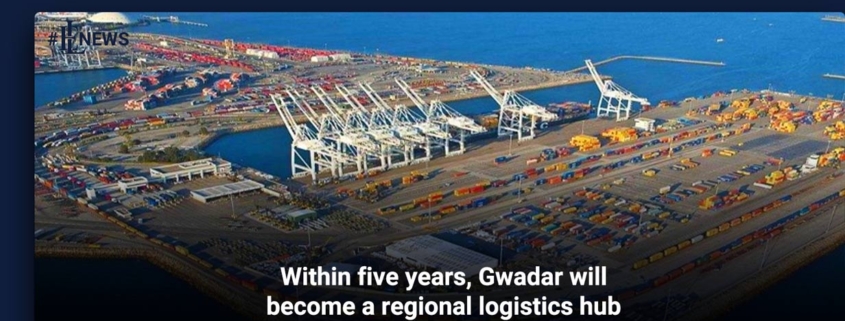
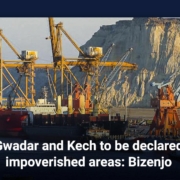

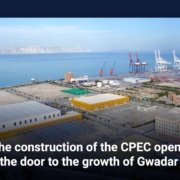
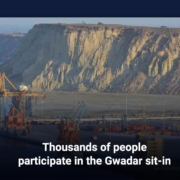
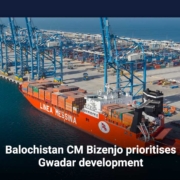


Leave a Reply
Want to join the discussion?Feel free to contribute!